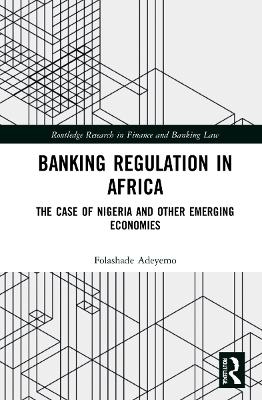
Banking Regulation in Africa
The Case of Nigeria and Other Emerging Economies
Seiten
2021
Routledge (Verlag)
978-0-367-86105-6 (ISBN)
Routledge (Verlag)
978-0-367-86105-6 (ISBN)
There is scarce literature on the development of banking regulation in Nigeria, or the scope of powers of the Central Bank of Nigeria, which is its core banking sector regulator. The critical impetus of this book is to contribute to the literature of this area, with a detailed exploration of the Nigerian regulatory architecture.
There is little literature on the development of banking regulation in Nigeria, or the scope of powers of the Central Bank of Nigeria, which is its core banking sector regulator. The critical impetus of this book is to contribute to the literature of this area, with a detailed exploration of the Nigerian regulatory architecture. In addition, the book also engages in a comparative analysis with two emerging economies in Africa: South Africa and Kenya. It also considers the UK and the US as comparator jurisdictions in light of their regulatory responses to the global financial crisis of 2008. This book contributes to the ongoing discourse in this area by exploring, in detail, the theoretical underpinnings of regulation and supervision, to determine whether there is an understanding of what constitutes effective regulation in these jurisdictions.
Given that Nigeria is the core jurisdictional focus, a historical account of banking exchanges from the pre-colonial era to more recent times is provided. Offering an understanding of how political, local and economic settings, in conjunction with the theories of regulation, have impacted and influenced regulatory development in Nigeria, the book engages in an examination of Nigeria’s historical experiences with bank failures, including the banking crisis it experienced in 2008. The newly enacted Banks and Other Financial Institutions Act 2020 is also explored as part of this discourse. Through a critical analysis of the law, the book demonstrates that the Nigerian regulator has historically adopted a reactionary strategy, instead of a proactive and pragmatic approach, which is imperative for an effective regulatory regime. The outcome of this analysis is that there are lessons to be learned, and proposals are discussed in order to rethink the act of banking regulation.
There is little literature on the development of banking regulation in Nigeria, or the scope of powers of the Central Bank of Nigeria, which is its core banking sector regulator. The critical impetus of this book is to contribute to the literature of this area, with a detailed exploration of the Nigerian regulatory architecture. In addition, the book also engages in a comparative analysis with two emerging economies in Africa: South Africa and Kenya. It also considers the UK and the US as comparator jurisdictions in light of their regulatory responses to the global financial crisis of 2008. This book contributes to the ongoing discourse in this area by exploring, in detail, the theoretical underpinnings of regulation and supervision, to determine whether there is an understanding of what constitutes effective regulation in these jurisdictions.
Given that Nigeria is the core jurisdictional focus, a historical account of banking exchanges from the pre-colonial era to more recent times is provided. Offering an understanding of how political, local and economic settings, in conjunction with the theories of regulation, have impacted and influenced regulatory development in Nigeria, the book engages in an examination of Nigeria’s historical experiences with bank failures, including the banking crisis it experienced in 2008. The newly enacted Banks and Other Financial Institutions Act 2020 is also explored as part of this discourse. Through a critical analysis of the law, the book demonstrates that the Nigerian regulator has historically adopted a reactionary strategy, instead of a proactive and pragmatic approach, which is imperative for an effective regulatory regime. The outcome of this analysis is that there are lessons to be learned, and proposals are discussed in order to rethink the act of banking regulation.
Folashade Adeyemo is a Lecturer in Law at University of Reading, UK
1. The Nigerian Banking System 2. Banking Regulation: Justification, Theory and Rationale 3. Banking Regulation in Nigeria 4. Regulatory Responses to Financial Crises 5. Understanding Nigerian Bank Regulation: A Closer Look at Bank Licence Revocation 6. A Scheme for Reform
| Erscheinungsdatum | 30.12.2021 |
|---|---|
| Reihe/Serie | Routledge Research in Finance and Banking Law |
| Verlagsort | London |
| Sprache | englisch |
| Maße | 156 x 234 mm |
| Gewicht | 520 g |
| Themenwelt | Recht / Steuern ► Allgemeines / Lexika |
| Recht / Steuern ► EU / Internationales Recht | |
| Recht / Steuern ► Wirtschaftsrecht ► Bank- und Kapitalmarktrecht | |
| Wirtschaft ► Betriebswirtschaft / Management ► Finanzierung | |
| Betriebswirtschaft / Management ► Spezielle Betriebswirtschaftslehre ► Bankbetriebslehre | |
| ISBN-10 | 0-367-86105-4 / 0367861054 |
| ISBN-13 | 978-0-367-86105-6 / 9780367861056 |
| Zustand | Neuware |
| Informationen gemäß Produktsicherheitsverordnung (GPSR) | |
| Haben Sie eine Frage zum Produkt? |
Mehr entdecken
aus dem Bereich
aus dem Bereich
warum unser Geld stirbt und wie Sie davon profitieren
Buch | Hardcover (2024)
FinanzBuch (Verlag)
CHF 41,95
Erinnerungen des Chefökonomen
Buch | Hardcover (2024)
Vahlen (Verlag)
CHF 34,85


